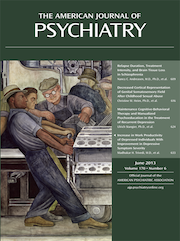Monthly Injectable Naltrexone for Pathological Gambling
To the Editor: No medication is approved for the treatment of pathological gambling. Although oral naltrexone appears to be the most promising among seven therapeutic drugs investigated for gambling (1), poor adherence to oral naltrexone can be a problem (2). In addition, hepatotoxicity can occur in gambling patients taking oral naltrexone and nonsteroidal anti-inflammatory drugs (NSAIDs) concurrently (3). In contrast to oral naltrexone, injectable naltrexone did not cause hepatotoxicity in patients taking NSAIDs (4) and could improve medication adherence. Injectable naltrexone is approved for the treatment of alcohol dependence and opioid dependence, but the use of injectable naltrexone for gambling has not been reported. We report here the first case to our knowledge of gambling successfully treated with naltrexone injection.
Case Report
A 58-year-old man with alcohol dependence in remission, depression, and a 4-year history of pathological gambling presented to a clinic for the treatment of gambling. His gambling started after the initiation of pramipexole to control leg spasm and restless leg syndrome. He took pramipexole more than prescribed (up to 4 mg/day) as it significantly reduced his physical symptoms. This led to more gambling (casinos and pull tabs) and adversely affected his business, self-esteem, family relationships, and finances (he incurred gambling losses of $100,000). Gamblers Anonymous was not available nearby. Oral naltrexone was prescribed, and the dosage was increased to 200 mg/day to treat his gambling (3). Eight months later, after missing several appointments, he returned to the clinic confessing that he had not adhered to his oral naltrexone regimen after taking the drug for only a few weeks because it did not help him. He continued to gamble and lost up to $2,000 per month even after pramipexole was switched to clonazepam. A 5-week residential gambling program was not effective. He finally agreed to receive intramuscular naltrexone, 380 mg/month. A few months later, he denied having any craving to gamble. Clonazepam was switched back to pramipexole, which was more effective for restless leg syndrome. He abstained from gambling during the next 12 months of follow-up while receiving monthly injectable naltrexone and taking pramipexole. He abstained from alcohol during the treatment, and his depression, treated with citalopram, remained relatively stable.
Discussion
This case indicates that injectable naltrexone may successfully control gambling cravings and behaviors. Once-monthly intramuscular naltrexone may have an advantage over oral naltrexone for gambling patients with poor adherence to daily oral naltrexone, those with concurrent use of dopamine agonist for Parkinson’s disease and other neurological disorders, and those with concurrent use of NSAIDs. Because a placebo response is reported in the treatment of pathological gambling, further research is needed to examine the efficacy of injectable naltrexone for this indication.
1 : Gambling disorders. Lancet 2011; 378:1874–1884Crossref, Medline, Google Scholar
2 : Persistence with oral naltrexone for alcohol treatment: implications for health-care utilization. Addiction 2008; 103:1801–1808Crossref, Medline, Google Scholar
3 : Double-blind naltrexone and placebo comparison study in the treatment of pathological gambling. Biol Psychiatry 2001; 49:914–921Crossref, Medline, Google Scholar
4 : Hepatic safety of once-monthly injectable extended-release naltrexone administered to actively drinking alcoholics. Alcohol Clin Exp Res 2008; 32:498–504Crossref, Medline, Google Scholar



